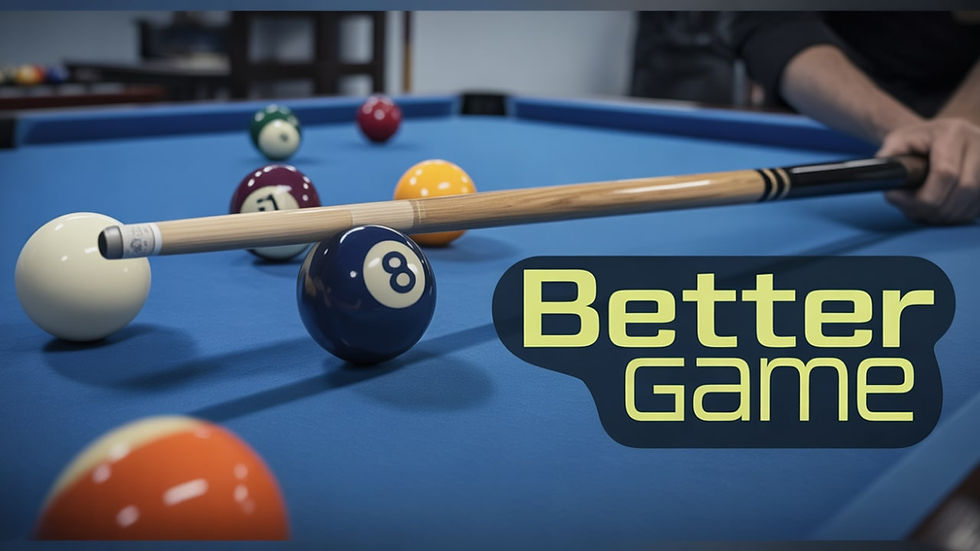From Pub Nights to Personal Bests: Why Investing in a Good Cue Really Matters
- Jul 24, 2025
- 4 min read
Updated: Sep 14, 2025
There’s something about walking into a cozy English pub on a Friday night that creates lasting memories. The familiar sounds of chatter, the clink of glasses, and the gentle thud of a beautiful snooker shot from deep in the back room all come together to form a magical atmosphere. For many of us, this is where our love for the game begins. We borrow a beat-up cue stick from behind the bar, and our friends cheer us on as we sink a black ball. Isn’t it magical?
But sooner or later, most amateurs realize: not all cues are created equal. In fact, your choice of English pool cue could be the difference between hitting a good shot occasionally and achieving that coveted personal best.
Why That Old Pub Cue Just Won’t Do

Don’t get me wrong – we’ve all used a ‘public’ snooker cue. The cue tip is wobbly, the cue shaft is bent, and it’s covered in chalk, practically blue all over. It works well for a laugh with friends, but when you start taking the game seriously, it becomes more of a hindrance than you’d think.
A good quality billiard snooker cue feels like an extension of your arm. It gives you the confidence to deliver exactly what you want, whether you're aiming for a precise backspin or a soft shot. There are no unnecessary kicks and no unexpected slips. Just pure, satisfying connection.
The Pool Cue Conundrum: Why Investing in a Good Cue Is So Important

You wouldn't run a marathon in someone else's shoes, so why settle for an old pool cue stick? Whether you're competing in a smoky bar league or chasing a century at your local snooker hall, the right pool cue changes everything. It affects the feel of your fingers, the balance of your bridge, and the satisfying thud as the cue ball obeys your will. Get it wrong, and you're fighting your billiard cue. Get it right, and the game will fall into place.
Players often ask, “What’s the difference between a snooker cue and an English pool cue?” It's a natural question, especially for new players. Let’s clear that up first.
Snooker vs English Pool – Purpose and Precision Comparison

Snooker cues are typically longer and thinner, with the cue tip usually around 9.5mm. This design allows for more precise control, which is crucial on larger snooker tables and with smaller cue balls. They are perfect for those pinpoint shots, feather-light "cannonball" shots, or that satisfying long red shot down the sideline.
On the other hand, English pool cues are usually slightly thicker at the cue tip (around 8-9mm) and have a shorter cue shaft. They are designed for faster, more reactive play, making them great for moving around tight crowds or playing doubles locally.
If you're a regular at the pool table, you'll want a quality pool cue that provides enough weight, grip, and responsiveness to hit clean shots.
It’s Not Just for the Pros
Most people think they just need "a good snooker cue" - but what does that really mean when it comes to investing in a good cue?
The truth is, “good” varies from person to person. It depends on the size of your hands, your playing style, your grip, and even your stance. Some players prefer a heavier butt for power, while others prefer a lighter butt for a delicate feel. Then there’s the joint type, the tip hardness, the taper… It’s easy to get lost in the details.
But here’s the thing: when you invest in a snooker cue that feels right, you’re investing in your own enjoyment. When your billiard cue stick feels right, your game changes. You stop hesitating and start hitting the cue ball fluidly. Your shots aren’t forced; they’re natural and confident.
Many average players think good cues are only for experienced club champions or those looking to go pro. No! Anyone who loves the game deserves a pool cue that reflects the hard work they put into it. Not the one your friend uses, and certainly not the cheapest one on the internet.
Cue Love: The Emotional Side of the Game
Ask any seasoned player, and they’ll tell you—your billiards cue stick isn’t just wood and glue. It’s been there during your first 20 break, your last-frame decider, and the night you shocked the club champion.
The feel of the wood grain, the comfort of the grip, and the stories etched into every scratch and varnish mark make a proper cue yours. It becomes a part of you, much like a guitar becomes a part of a musician’s soul.
So don’t rush it. Choosing your cue should feel a bit like falling in love—maybe not at first sight, but you’ll know once you’ve found the right one.
Bringing People Together, One Shot at a Time
The beauty of investing in your own cues is that it often reignites your love for the game. Suddenly, you want to play more, improve your potting, and hit that tricky safety shot. It also gives you a reason to get together with friends, challenge each other, and share those little victories over a beer.
If you ask me, that’s what snooker and English pool have always been about — connection. Not just with cue balls and pockets, but with people too.
The Journey to Finding Your Perfect Cue
Finding the right cue is a journey. It requires patience and exploration. Start by trying out different cues at your local club or shop. Pay attention to how each one feels in your hands. Does it balance well? Is the grip comfortable? These factors can significantly impact your performance.
Don’t hesitate to ask for recommendations from fellow players. They may have insights or experiences that can guide you toward the right choice. Remember, the goal is to find a cue that complements your playing style and enhances your enjoyment of the game.
Conclusion: Invest in Your Game
In conclusion, investing in a good cue is not just about performance; it's about enhancing your overall experience. A quality cue can elevate your game, boost your confidence, and deepen your connection to snooker and pool.
So, take the time to find the cue that feels right for you. Your game will thank you, and you’ll create even more magical memories along the way.
Author Bio:

Dr. Robin Alexander is an MD Pathologist, passionate guitar enthusiast, and lifelong snooker fan. He combines medical precision with a love for music and sport. Connect with him on *LinkedIn




Comments